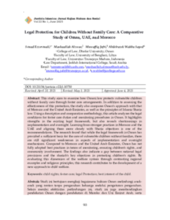This study aims to examine how Omani law protects vulnerable children without family care through foster care arrangements. In addition to assessing the effectiveness of this protection, the study also compares Oman's approach with that of Morocco and the United Arab Emirates, as well as the principles of Islamic Sharia law. Using a descriptive and comparative methodology, this article analyzes the legal conditions for foster care duties and monitoring procedures in Oman. It highlights strengths in the existing legal framework, but also reveals shortcomings in implementation and oversight. Learning from stronger practices in Morocco and the UAE and aligning them more closely with Sharia objectives is one of the recommendations. The research found that while the legal framework in Oman has provided a sufficient basis for the care of vulnerable children without families, there are still significant weaknesses in aspects of implementation and oversight mechanisms. Compared to Morocco and the United Arab Emirates, Oman has not fully adopted best practices in terms of monitoring, ensuring children's rights, and community involvement. The findings also indicate a gap between national legal provisions and the shariah's key objectives in protecting children's rights. By evaluating this dimension of the welfare system through contrasting regional examples and religious principles, this research contributes to the development of a new approach to child welfare.

